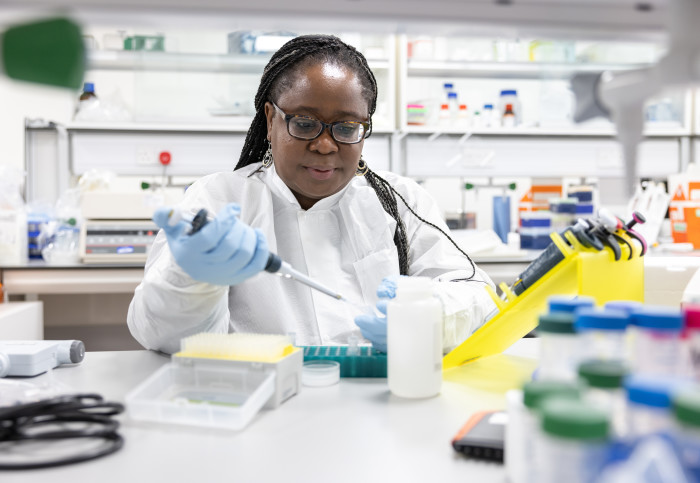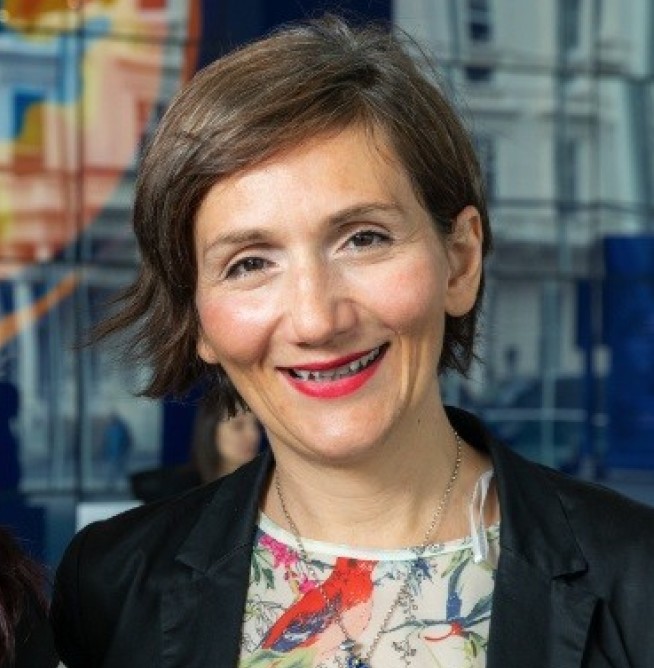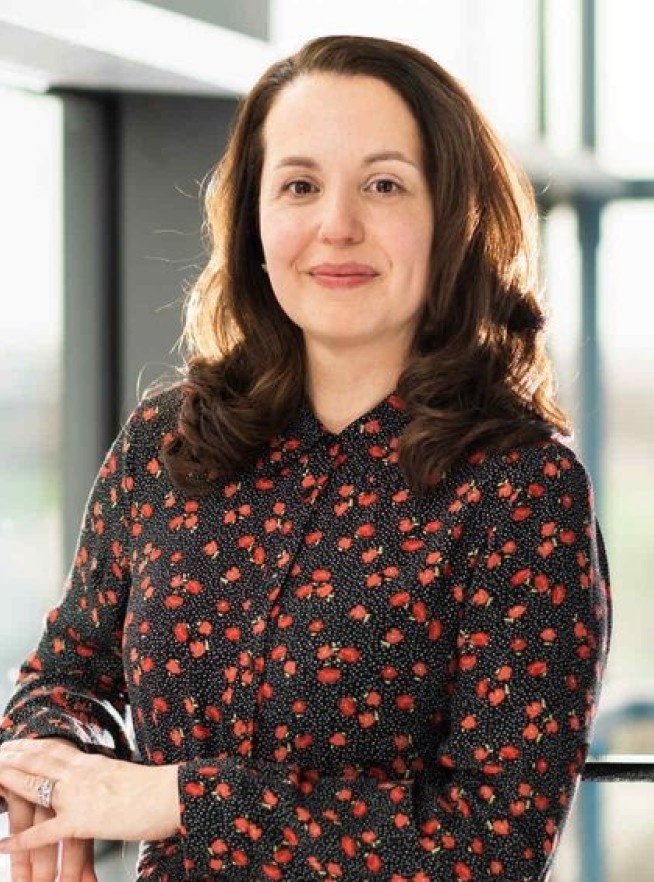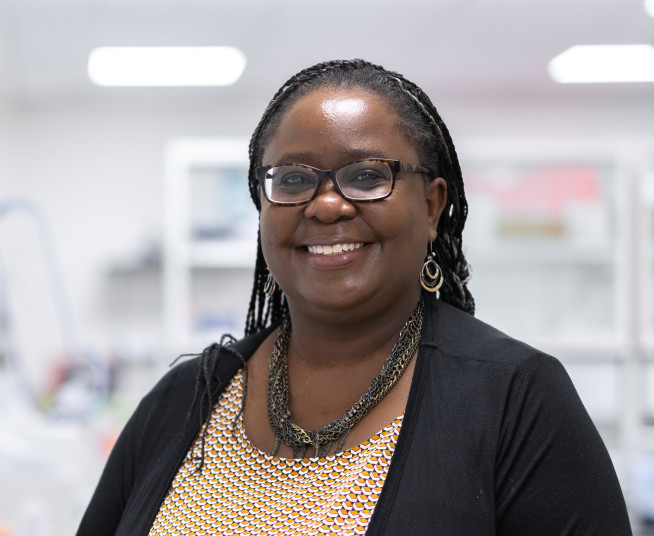WE Invent means patent costs are no barrier for Imperial’s women entrepreneurs
by Ian Mundell

WE Invent has helped Dr Catherine Kibirige and other women at Imperial protect their inventions.
Female innovators at Imperial can benefit from a dedicated fund that covers the costs of patenting an invention.
Imperial has been working hard to build an ecosystem that supports women with innovations they want to commercialise, with programmes such as WE Innovate and WE Accelerate helping early-stage startup teams with coaching, mentorship, prizes and funding. An important part of this support is WE Invent, a budget set aside to pay the costs of filing a first patent on inventions developed by female researchers, or research teams led by women.

Protecting intellectual property can be expensive, and the College has to prioritise where it spends its money. “The Industry Partnerships and Commercialisation teams have a limited budget, so they can’t file patents on every idea with commercial potential,” explains Dr Emma Toumi, Associate Director of Intellectual Property Strategy in Enterprise.
These decisions are based on the quality of the science, the commercial potential of the invention, and how much competition there is likely to be in its sector. However, with only a small number of inventions from female-led teams in contention to begin with, there is a risk that only a very few will make the cut.

“The idea of WE Invent is to ensure that we always have the opportunity to file a patent for female inventors, or teams lead by women, regardless of the availability of other funds,” explains Dr Vjera Magdalenic-Moussavi, Director of Industrial Partnerships and Commercialisation for the Faculty of Medicine.
The scheme both supports women with inventions to patent, and gives the College a means to encourage entrepreneurial thinking among female members of staff. “We need to encourage more women to invent, and while there are several factors that can hold them back, the patent budget should not be one of them,” says Dr Toumi. “As soon as women have the time to work on a technology that could be patented, then we should do everything we can to progress it.”
This encouragement is badly needed, given the low rate of patenting by women in the broader scientific community. Only 13.2% of European patents are filed by women, according to a recent study from the European Patent Office, with the UK below average at 12.4%. “That baseline is a tragic state of affairs,” says Dr Magdalenic-Moussavi.
A drug to control labour
One of the researchers to benefit from WE Invent is Professor Aylin Hanyaloglu of the Department of Metabolism, Digestion and Reproduction. In the course of her research, she identified a small molecule that activates a signalling receptor involved in labour that can control both contractions and inflammation, opening up the possibility of a drug for managing, or even preventing, pre-term birth. “There is a very big unmet need in new drug discovery approaches within that space,” she says.

Having patented the molecule with the support of WE Invent, Professor Hanyaloglu is now considering how best to commercialise the discovery. She is leaning towards finding a commercial partner rather than creating a startup to take it further, but the experience has given her a more entrepreneurial outlook. “Going through this process has made me think about other research we could commercialise and work on in the team, so it has been a good catalyst.”
She thinks that WE Invent sends an important signal about Imperial’s support for female innovators. “I’d like to think that my idea was competitive enough to be accepted, even if there was just one patenting fund for everyone. But having this money put aside for female inventors sends a message that the College wants to encourage us. It says: you can do this, even if it sometimes feels that everything else is stacked against you.
Personalised dietary advice
Another WE Invent beneficiary is Dr Isabel Garcia Perez, also from the Department of Metabolism, Digestion and Reproduction, who has already moved from patenting to commercialisation with the creation of the startup company Melico Sciences. This offers personalised recommendations for a healthy diet, based on the analysis of thousands of biomarkers in a small sample of urine.

Patenting the model used for this analysis was not straightforward, but being able to draw on the WE Invent budget meant that cost was not a barrier.
“This enabled us to go through quite a complex patenting process with the team, which we wouldn’t necessarily have pursued under normal circumstances, given the expense involved,” Dr Magdalenic-Moussavi recalls.
The result was unequivocal support for researcher with great entrepreneurial potential. “Isabel is an early career researcher with a lot of drive, who has worked hard to be an innovator and a leader.”
HIV testing at point of care?
Dr Catherine Kibirige from the Department of Infectious Disease is just embarking on her entrepreneurial journey. She is the lead inventor of an HIV-1 quantification and detection assay that has shown 100% sensitivity and 93% specificity for a very diverse range of recently circulating HIV-1 isolates. This has been patented by Imperial and three of the institutions she previously worked for while developing the assay.

Dr Kibirige now has funding to develop and field-test an easy-to-use, ambient-temperature kit based on the assay, which promises to be an effective way of carrying out research and point-of-care treatment monitoring in the world’s poorer regions.
“This test is just as sensitive as the currently approved commercial assay, promises to be simpler and more affordable, and I think that will work better for resource-limited settings where a lot of people don’t have access to a viral load test,” Dr Kibirige says.
She sees commercialisation as the most effective way of getting the technology into the field, and having WE Invent cover the patenting costs freed her up to concentrate on moving the project forward. “I’m?advocating for its use in developing countries, and networking with industry partners who can help me do that. So, that’s the current focus of my research and where I want to go with it.”
After participating in the MedTech Superconnector in 2022, Dr Kibirige’s HIVQuant project has now been accepted into the 2023 cohort of WE Accelerate, and obtained a UKRI Impact Accelerator Account award, which will support its further development as a commercial proposition.
Potential for more patents
While these examples all come from the medical sciences, WE Invent has supported academics across the disciplinary spectrum, from bioengineering to materials and chemical engineering. And one of the first people to benefit from WE Invent support was Jane Neary, Director of Campus Services, who invented and patented a new catering trolley. “So, we are supporting any woman at Imperial who has an invention, whether they are academics or working in another capacity,” says Dr Magdalenic-Moussavi.
We can file ten patents a year from the WE Invent budget. If we could do that, it would be phenomenal. Dr Emma Toumi Associate Director of IP Strategy
While WE Invent has clearly demonstrated its usefulness, it has the potential to help many more female innovators than it does at present. “We can file ten patents a year from the WE Invent budget, and if we were able to do that, it would be phenomenal,” says Dr Toumi. “It would mean that excellent proportion of our patents would be female-led.”
Dr Magdalenic-Moussavi also hopes to see many more researchers take advantage of WE Invent in future. “We’ve spent a lot of time educating the ecosystem, so that it has a focus on female entrepreneurship, first with students and now expanding to early career researchers. And that is slowly reaping benefits, as we see the growth in women thinking about IP, which will result in more patent filings.”
Article text (excluding photos or graphics) © Imperial College London.
Photos and graphics subject to third party copyright used with permission or © Imperial College London.
Reporter
Ian Mundell
Enterprise